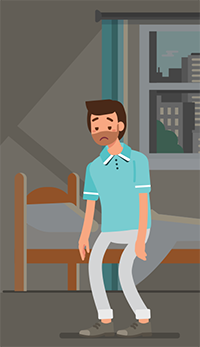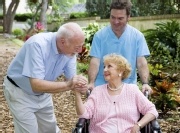
A hallucination is defined as an abnormal sensory perception – typically auditory or visual - that occurs when a person is awake and conscious. Basically, a person experiencing a hallucination sees or hears something that is not there. A hallucination can also involve the other senses, although this is rare. While individuals may hallucinate for a variety of reasons, there are a few common causes that specifically affect the elderly. Seniors who suffer from hallucinations may become easily scared or agitated and should not be left alone. A qualified in-home caregiver who uses a reliable homecare system or homecare software such as ClearCare Online can recognize the symptoms of a hallucination and react quickly to give necessary aid.
Common Causes of Hallucination in the Elderly
Hallucinations can be difficult to diagnose. Many family members even tend to question the validity of the senior’s complaints when it comes to seeing or hearing things that are not there. It’s important to make an appointment with the senior’s physician if he begins experiencing hallucinations, as they can indicate a serious medical problem. Caregivers can use ClearCare Online’s homecare system or homecare software for scheduling such appointments.
Doctors will likely try and rule out a psychiatric disorder first, such as bipolar, schizophrenia, or depression – which can all lead to hallucinations. Other common causes of hallucinations may include:
- Sleep deprivation
- Dehydration
- Epilepsy
- Vision or hearing loss
- Drug or alcohol abuse
- Brain cancer
- Liver or kidney failure
- Dementia or Alzheimer’s Disease
- Charles Bonnet Syndrome
Hallucinations may also be caused by medication side effects. Certain drugs interactions can be deadly, so be sure to use a sophisticated medication management system, such as ClearCare Online’s homecare software and homecare system.
Symptoms of Hallucinations
Without careful observation, hallucinations may go unnoticed. Caregivers who use a sophisticated homecare system and homecare software like ClearCare Online can refer to their client’s individual assessment for details on what to look for. Symptoms may include:
- Drastic change in behavior or mood
- Anxiety
- Heightened sense of awareness
- Reduced sense of judgment
- Confusion and delusions
- Difficulty speaking
- Insomnia
- Withdrawal
- Referring to things or people that are not there
To treat hallucinations, the root cause must be determined. For example, patients with Charles Bonnet Syndrome can reduce or eliminate their hallucinations by brightening their environment. If the root cause cannot be identified, anti-anxiety medicine or anti-depressants may be prescribed. Helping the patient to relax and get plenty of rest may reduce the frequency of their hallucinations.
Understandably, hallucinations can be very disorienting and disturbing – both to the senior and for those around him. Quite often these abnormal sensory experiences can be reduced or eliminated with the right treatment, so be sure to speak with a physician right away. If you have a loved one who is experiencing hallucinations, it is best not to leave them alone. A qualified caregiver who uses ClearCare Online’s homecare system and homecare software can give you real-time updates on their care while you are away. Hopefully, with time and treatment, their hallucinations will become a thing of the past.









